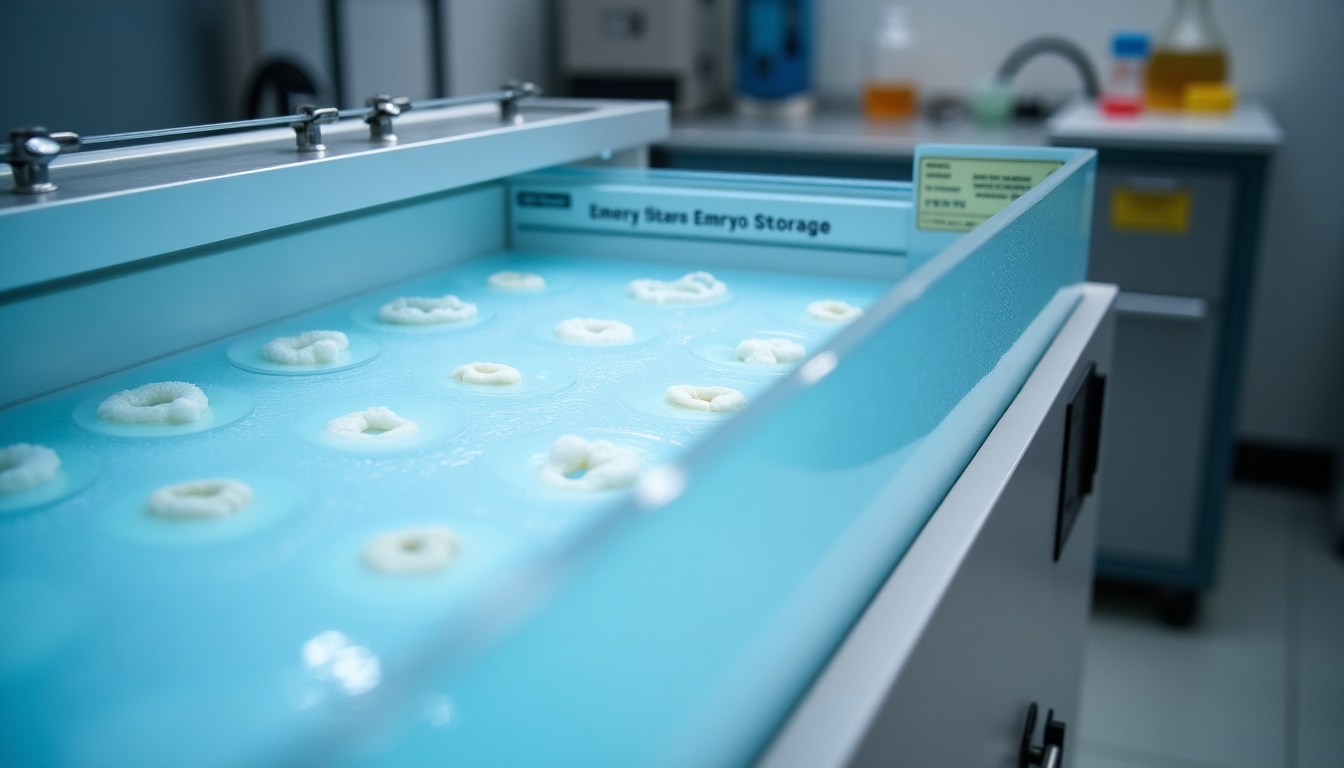The Future of Family Planning: Long-Term Storage of Cryopreserved Embryos
May 17, 2025, 5:21 p.m.
Embryo cryopreservation is a revolutionary technology that allows individuals and couples to preserve their fertility for the future. By freezing embryos, they can be stored for long periods, giving people the opportunity to start a family when the time is right. This article delves into the process of long-term storage of cryopreserved embryos, its benefits, and the considerations involved.

Embryo cryopreservation is a process where embryos are frozen and stored for future use. This technology is often used in conjunction with in vitro fertilization (IVF), where eggs are fertilized with sperm in a laboratory setting to create embryos. These embryos can then be frozen and stored for later use.
The process of cryopreservation involves cooling the embryos to very low temperatures, typically around -196°C, using liquid nitrogen. This freezing process stops all biological activity, allowing the embryos to be stored for extended periods without deterioration.
Once the embryos are frozen, they can be stored for long periods, often for many years. The storage facilities are specially designed to maintain the extremely low temperatures required to keep the embryos viable. These facilities are equipped with backup systems to ensure that the temperature remains constant, even in the event of a power outage.
The length of time that embryos can be stored varies depending on the laws and regulations of the country or state where the storage facility is located. In some places, there may be no time limit, while in others, there may be restrictions on how long embryos can be stored.

One of the main benefits of long-term storage is that it allows individuals and couples to preserve their fertility for the future. This can be particularly important for people who are facing medical treatments that may affect their fertility, such as chemotherapy or radiation therapy for cancer. By freezing embryos before undergoing these treatments, they can increase their chances of having a biological child in the future.
Another benefit is that it gives people more flexibility in terms of when they start a family. For example, some people may choose to focus on their careers or other life goals before having children. By freezing embryos, they can delay starting a family until they are ready.
Additionally, long-term storage can be beneficial for couples who have undergone IVF and have extra embryos that they do not wish to use immediately. These embryos can be stored for future use, potentially reducing the need for additional IVF cycles.

One important consideration is the cost. Storing embryos can be expensive, with fees for the initial freezing process and ongoing storage fees. These costs can add up over time, so it's important for individuals and couples to factor this into their decision-making process.
Another consideration is the legal and ethical aspects of embryo storage. In some cases, there may be laws or regulations that dictate how long embryos can be stored or what happens to them if the individuals or couples no longer wish to use them. It's important to understand these laws and regulations before proceeding with embryo cryopreservation.
Additionally, there is always a small risk that the embryos may not survive the freezing and thawing process. While the success rates for embryo cryopreservation are generally high, there is still a chance that some embryos may not be viable after being thawed.
As someone who has gone through the process of embryo cryopreservation, I can attest to the emotional and financial considerations involved. When my partner and I decided to freeze embryos, we had to weigh the costs and the potential benefits. It was a difficult decision, but ultimately, we felt that it was the right choice for us.
One thing that surprised me was the amount of paperwork and legal documentation required. We had to sign numerous consent forms and make decisions about what would happen to the embryos in various scenarios, such as if one of us passed away or if we decided not to use them.
Despite the challenges, I'm grateful that we had the option to freeze embryos. It gave us peace of mind knowing that we had a backup plan for starting a family in the future.

When individuals or couples are ready to use their frozen embryos, the embryos are thawed and then transferred to the uterus. The success rates for frozen embryo transfers are generally comparable to those of fresh embryo transfers, although they can vary depending on various factors such as the age of the woman at the time the embryos were frozen and the quality of the embryos.
It's also worth noting that not all frozen embryos will survive the thawing process. However, the majority of embryos do survive, and many people have successfully had children using frozen embryos.
Another important aspect to consider is the emotional impact of embryo cryopreservation. For some people, the decision to freeze embryos can be emotionally challenging, as it involves making decisions about potential future children. It's important to have open and honest discussions with your partner, if applicable, and to seek support from healthcare professionals or counselors if needed.
In summary, the long-term storage of cryopreserved embryos is a valuable option for individuals and couples who wish to preserve their fertility for the future. It offers numerous benefits, including the ability to delay starting a family and the potential to have biological children after medical treatments that may affect fertility. However, it's important to carefully consider the costs, legal and ethical aspects, and emotional impact of embryo cryopreservation.
For those considering embryo cryopreservation, it's essential to consult with a fertility specialist who can provide personalized advice and guidance. They can help you understand the process, the success rates, and the potential risks involved.